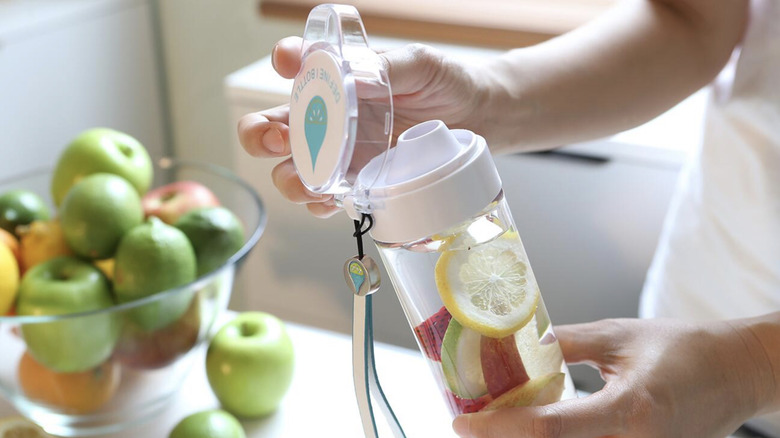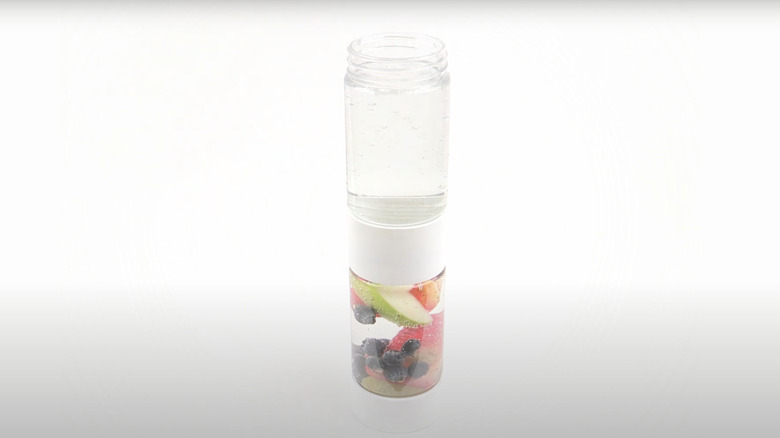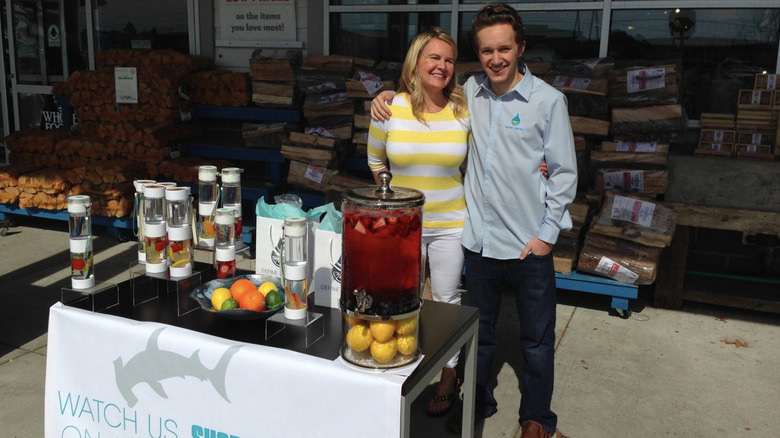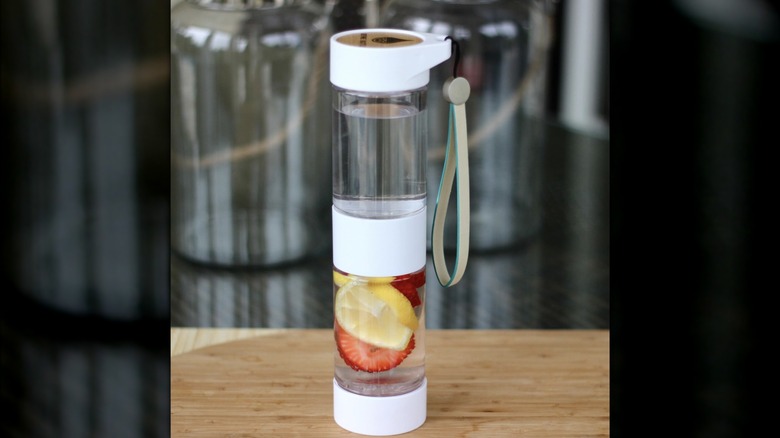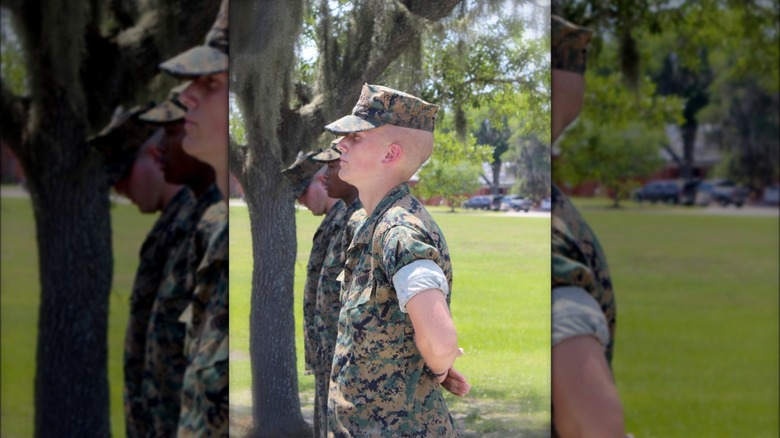Where Is Define Bottle From Shark Tank Today?
In 2014, 15-year-old Carter Kostler stepped onto the Shark Tank stage with a mission: To help people ditch sugary drinks in favor of something healthier. Inspired by his mother's homemade "spa water," he sketched out the design for the Define Bottle, a sleek, double-chambered water bottle made to naturally infuse water with fruit flavors.
Kostler even explained in an interview with Entrepreneur Magazine, "I wanted to come up with a healthy, natural way for people to hydrate on the go," and that "a big part of my mission is to get people of all ages off of sugary drinks such as soda."
The idea was simple — users could load fresh fruit into the bottom compartment without the mess of seeds and pulp. After all, adding fruit to your water will benefit your body, offering a refreshing alternative to sugar-laden drinks. The concept took off quickly. According to Entrepreneur Magazine, within months of developing the idea, Kostler secured patent-pending status and began generating buzz from health-conscious consumers. His bottle was even named one of Entrepreneur's brilliant companies in 2013 and earned recognition as a finalist in Michelle Obama's Partnership for a Healthier America's "End Childhood Obesity Innovation" Challenge. This attention helped Kostler land features in major publications and interviews about his journey as a young entrepreneur. By the time he appeared on Shark Tank, he had already made a name for himself — but securing a deal with the Sharks was another challenge entirely.
What happened to Define Bottle on Shark Tank?
When Carter Kostler pitched Define Bottle to the Sharks during a "young entrepreneur" episode, he came in strong, asking for $100,000 in exchange for 20% equity. He made it clear he was determined to build a brand that encouraged healthier drinking habits. The Sharks, however, weren't entirely sold. While some praised the sleek design and eco-friendly concept, others questioned whether a fruit-infused water bottle had enough staying power in such a competitive market.
Only one Shark — Robert Herjavec — was willing to make an offer: $100,000 for 40% equity. It was too high of an ask for Kostler and his parents to accept; they thought Define Bottle was worth more than that.
Kostler left the tank without a deal. Without an investment, he would have to rely on his own efforts and outside investors to grow the brand. Still, leaving the tank empty-handed wasn't necessarily the end – many businesses have gone on to succeed without a Shark behind them.
Define Bottle after Shark Tank
Even without a deal from the Sharks, Define Bottle didn't fade into obscurity. The product continued to sell, gaining traction among health-conscious consumers and those looking for an easy way to make water more exciting. Carter Kostler kept pushing forward, leveraging the attention from Shark Tank to boost Define Bottle's visibility.
A few months later, Carter Kostler spoke to the Virginian-Pilot and gave an update on Define Bottle. "The decision to go on 'Shark Tank' was also a big risk and we turned them down at first," he revealed. "It is a huge commitment in time [and] money, and a big emotional risk, as well, with no guarantee that your segment will ever air on TV." In the end, though, the appearance did help the business out. "Before 'Shark Tank,' we only had one person outside the family assisting us. Since 'Shark Tank,' we outsourced shipping to Fulfilltopia, a local fulfillment company, and brought on two more people," Kostler explained. Additionally, "Once 'Shark Tank' aired, we sold more than $225,000 in that one weekend," he said, mentioning that they had recently become profitable.
For a while, Define Bottle seemed to be thriving. The product was available on Amazon and in select retailers, and Kostler remained active in promoting it. But by 2017, updates about the brand had slowed, and signs of decline became apparent — meeting a fate similar to BottleKeeper from Shark Tank. The brand had lost momentum, though it wasn't immediately clear what led to its downfall.
Why did Define Bottle go out of business?
Despite its initial success, it's safe to speculate that Define Bottle struggled to compete in an increasingly crowded market. The rise of reusable bottles from major brands — combined with an influx of lower-cost fruit infusers — may have made it even harder for Define Bottle to stand out. Without the backing of a major retail partner, sustaining long-term profitability proved to be a challenge.
And while there is no official statement, it's also possible that manufacturing costs might have played a role in the company's decline. Unlike mass-produced water bottles from established brands, Define Bottle's more complex design likely resulted in higher production costs and lower profit margins. Over time, demand may have slowed, leading to the product quietly disappearing from retailers.
What's next for Carter Kostler?
After Define Bottle faded from the market, Carter Kostler moved into roles focused on business and leadership, according to his LinkedIn profile. In 2016, he officially shut down the company and went on to serve as a U.S. Marine.
His early success with Define Bottle earned him recognition as a promising young entrepreneur. While his first venture didn't go the distance, he did gain experience in developing, marketing, and scaling a product at a young age. Even as a teen, Kostler once shared, "It is important to know from the beginning that there are a lot of highs and lows, and there is no such thing as overnight success." And though Define Bottle didn't last, Kostler still showed adults that he meant business.
Today, Define Bottle's website is defunct, and its X account has been inactive since 2017, further signaling the brand's decline. However, as someone who built a brand from scratch at such a young age, it wouldn't be surprising if Kostler resurfaced with another project down the line.
